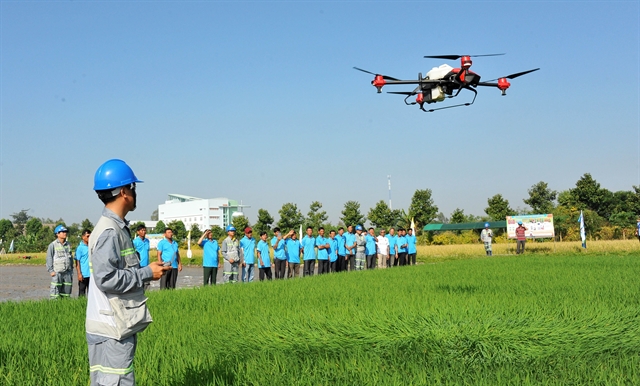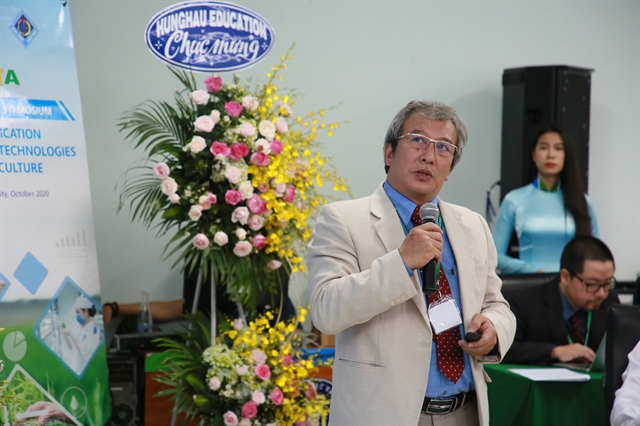 Society
Society

The use of advanced technology has contributed to nearly 35 per cent of the growth value of agriculture in Việt Nam for the last five years, Dr Từ Minh Thiện, rector of Văn Hiến University in HCM City, has said.

|
| Staff from Lộc Trời Group use a drone to spray fertiliser and pesticide on a paddy rice field in An Giang Province. — VNA/VNS.Photo Công Mạo |
HCM CITY — The use of advanced technology has contributed to nearly 35 per cent of the growth value of agriculture in Việt Nam for the last five years, Dr Từ Minh Thiện, rector of Văn Hiến University in HCM City, has said.
Thiện spoke on Friday at an international symposium on the application of advanced technologies in agriculture held at the university.
In the field of irrigation, for example, drip, sprinkler and underground irrigation systems are being used on different terrains, making watering more accessible and convenient. Such systems are typically attached to a flow controller which providers fertiliser for each type of crop, thus saving water and fertilizer, Thiện said.
In another field, biotechnology, gene mapping of many types of plants is used in ELISA and PCR techniques in the diagnosis and identification of viral diseases of plants.
For fruit trees, cellular technology is being used to create high-quality seedless fruit trees with micro-grafting techniques. This creates sources of disease-free starting material for breeding.
In addition, in vitro plant tissue culture technology has been used for years now, resulting in efficient propagating of many types of crops.
In wet-rice production, biotechnology is being used to breed rice varieties, with the use of slow-soluble fertilizers and saltwater warning systems in the provinces of Sóc Trăng, Đồng Tháp, and Trà Vinh.
"Biotechnology applications are an effective solution for advancing sustainable agriculture and limiting the negative impact of climate change,” Thiện said.

|
| Dr Từ Minh Thiện, rector of Văn Hiến University in HCM City, speaks about high-technology applications in agriculture. — Photo Courtesy of the university |
Blockchain is also being used in product traceability and supply chain management in the provinces of Long An, Tiền Giang, Đồng Tháp and others.
And in Đồng Tháp and Bến Tre provinces, automatic water quality monitoring systems are used. Technological advances improve the monitoring of automatic irrigation systems by quickly identifying the watering level of a tree, for example, and alerting farmers to the exact location of the water shortage area.
The systems use GPS and automatic routing to cover an entire plantation. The systems are mounted on a drone which can fly 20-30 metres above crop fields, such as a banana or fruit tree plantation.
Still in initial stages
Despite increased use, high-tech applications in agriculture are only in the initial stage of deployment and have focused primarily on crop production, Thiện said.
“But in the last 10 years, the country’s agricultural sector has seen robust developments, and agricultural products are now exported to 180 countries and territories,” he added.
Dr Lê Việt Dũng, former deputy rector of Cần Thơ University, said: “The spread of so-called essential technologies such as artificial intelligence, blockchain, drones, Internet of Things and others in agriculture is leading to increased yields, lower costs, and reduced environmental impact.”
These technologies are empowering farms to unlock new plant-based innovations and increasing their resilience to climate change, Dũng added.
Also speaking at the conference, Professor Hiroaki Funahashi of Okayama University, said that new biotechnologies were making it possible to improve domestic animals and quickly expand sustainable animal production.
“To accelerate sustainable animal production friendly to the environment, further development and integration of cutting-edge animal biotechnologies may be required,” he said.
High-tech use by enterprises
High-tech applications in Việt Nam’s agriculture have not been widely implemented on a household scale, and most are being used at enterprises and cooperatives due to the high investment costs and unstable market prices of fruits and vegetables.
Many large enterprises that have invested in these applications include Vingroup, PAN Group, Hoàng Anh Gia Lai, Lộc Trời Group, and others. They are carrying out support and cooperation programmes with cooperatives and farming households to create clean and safe food sources.
Their aim is to build methodical and effective production, directly training and guiding farmers in need of clean production processes, and offering technological, technical, and seed support.
They also aim to improve quality control during processing and before harvesting, and support brand development.
The one-day symposium, co-organised by Văn Hiến University, Cần Thơ University and Okayama University, focused on discussions and solutions related to the use of biotechnology in agriculture. VNS




